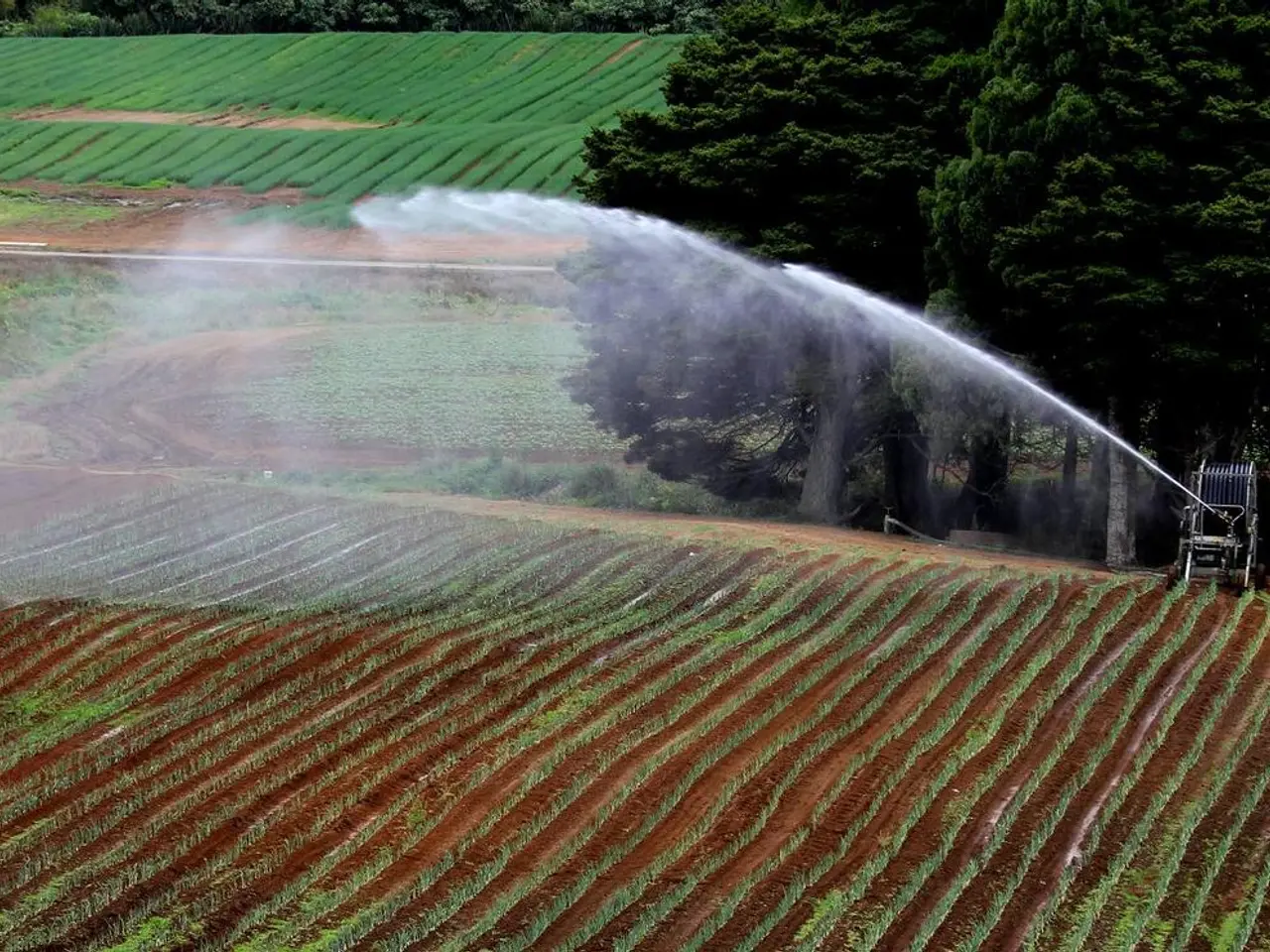Second Sustainable Agriculture Summit in 2025 Emphasizes Environmentally-Friendly Development as Key to India's Economic Advancement
At the 2nd Sustainable Agriculture Summit & Awards 2025 held in New Delhi, key initiatives and strategies for sustainable agriculture in India were outlined, emphasizing a holistic approach that integrates environmental sustainability, farmer welfare, and technology adoption to power India's economic future.
Union Minister Ramdas Athawale underscored the importance of a strong agricultural sector integrating sustainability with farmer welfare as critical to achieving India’s vision of a developed economy by 2047.
Farmer-Centric Growth
The summit highlighted the importance of farmer-centric growth, ensuring inclusivity and resilience in agricultural development. Ms Deepshikha, IAS, Collector & District Magistrate of Ferozepur, Punjab, is promoting chilli cultivation as a means to boost farmer welfare and improve incomes, soil health, and reduce environmental stress between paddy and wheat cycles.
Climate-Smart Agriculture Practices
Promotion of climate-smart agriculture practices that safeguard long-term soil health and reduce environmental impact was another focus. Siba P Mohanty, Managing Director of Hindustan Urvarak & Rasayan Limited (HURL), stressed the importance of responsible input management and water stewardship in securing the future of Indian agriculture.
Green Growth Strategies
Integration of green growth strategies that balance productivity with sustainability goals was also emphasized. Dr Vimala Prakash, Head of the Technology Innovation Center at IPL Biologicals Limited, highlighted the role of science-led innovation in bridging the gap between farm needs and sustainable outcomes.
Collaboration and Policy Reforms
Collaboration of government bodies, industry leaders, scientists, and development practitioners to accelerate adoption of sustainable farming innovations was another key aspect. Dr Navneet Anand, Executive Director of Sustainability Matters, stated that the summit is inspired by Prime Minister Narendra Modi’s vision of a Viksit Bharat, where agriculture is not a constraint but a catalyst for sustainable growth.
Policy reforms linking sustainability with farmer income resilience and incentives for responsible farming were also highlighted. Dr Rajendra Prasad, General Manager & Regional Head of SIDBI, emphasized the importance of SIDBI's role in encouraging entrepreneurship across industries, including agriculture.
Digital Tools and Precision Agriculture
Adoption of digital tools and precision agriculture technologies, including the use of nano-fertilizers, was another focus. Support for microfinancing and digital platforms to enable smallholder farmers to transition to sustainable practices while stabilizing incomes was also discussed.
Carbon Footprint Accounting and Export Competitiveness
Increasing awareness and preparation for carbon footprint accounting and export competitiveness under international mechanisms like the EU’s Carbon Border Adjustment Mechanism (CBAM) was also a significant topic.
Current government policies underpinning these strategies include Nutrient-Based Subsidy (NBS) reforms, promotion of nano-urea and biofertilizers, implementation of Digital Soil Health Cards, support for schemes like Namo Drone Didi and digital agriculture initiatives, commitment to voluntary carbon markets and green finance frameworks, and encouragement of policy incentives and subsidies that reward sustainable farmers.
Together, these initiatives and strategies represent a multifaceted, collaborative framework to make Indian agriculture more sustainable, resilient, and economically viable by 2025 and beyond. The summit brought together an influential cross-section of stakeholders, including farmers, industry leaders, scientists, development practitioners, and senior bureaucrats. India's agri-credit flow crossed Rs. 20 lakh crore in FY2024, but much of it remains concentrated in short-term crop loans rather than long-term climate-resilient infrastructure.
Union Minister Ramdas Athawale attended the 2nd Sustainable Agriculture Summit & Awards 2025, recognizing exemplary work across multiple categories, celebrating achievers such as Godrej Agrovet; IPL Biologicals; Hindustan Urvarak & Rasayan Limited (HURL); SeedWorks International Limited; Bihar Agricultural University, Sabour, Bhagalpur; Love Kumar, District Agriculture Officer & District Horticulture Officer of Jamtara; Agricultural Technology Management Agency (ATMA), Bhagalpur; Agri Entrepreneur Growth Foundation; Dhaksha; and the Federation of Seed Industry of India. Six IAS officers were honoured for their district-level sustainable initiatives.
- Union Minister Ramdas Athawale comprehensively highlighted the significance of a robust agricultural sector, integrating sustainability and farmer welfare as key to India’s envisioned developed economy by 2047.
- The summit accentuated the importance of farmer-centric growth, ensuring inclusivity and resilience in agricultural development, as demonstrated by the promotion of chilli cultivation by Ms Deepshikha for farmer welfare and income improvement, soil health preservation, and less environmental stress between paddy and wheat cycles.
- Siba P Mohanty, Managing Director of Hindustan Urvarak & Rasayan Limited (HURL), underlined the importance of responsible input management and water stewardship for securing the future of Indian agriculture.
- Integration of green growth strategies that harmonize productivity with sustainability goals was highlighted, with Dr Vimala Prakash stressing the role of science-led innovation in bridging the gap between farm needs and sustainable outcomes.
- Collaboration among government bodies, industry leaders, scientists, and development practitioners is essential to accelerate the adoption of sustainable farming innovations, as Dr Navneet Anand noted, inspired by Prime Minister Narendra Modi’s vision of a developed India where agriculture drives sustainable growth.
- Dr Rajendra Prasad underscored the importance of SIDBI’s role in fostering entrepreneurship across industries, including agriculture, while policy reforms linking sustainability, farmer income resilience, and incentives for responsible farming were also emphasized.
- Adoption of digital tools and precision agriculture technologies, including the utilization of nano-fertilizers, and support for microfinancing and digital platforms to empower smallholder farmers to transition to sustainable practices and stabilize incomes were discussed.
- Announcing India's readiness for international competition, the conference focused on increasing awareness and preparation for carbon footprint accounting and export competitiveness under mechanisms like the EU’s Carbon Border Adjustment Mechanism (CBAM).




